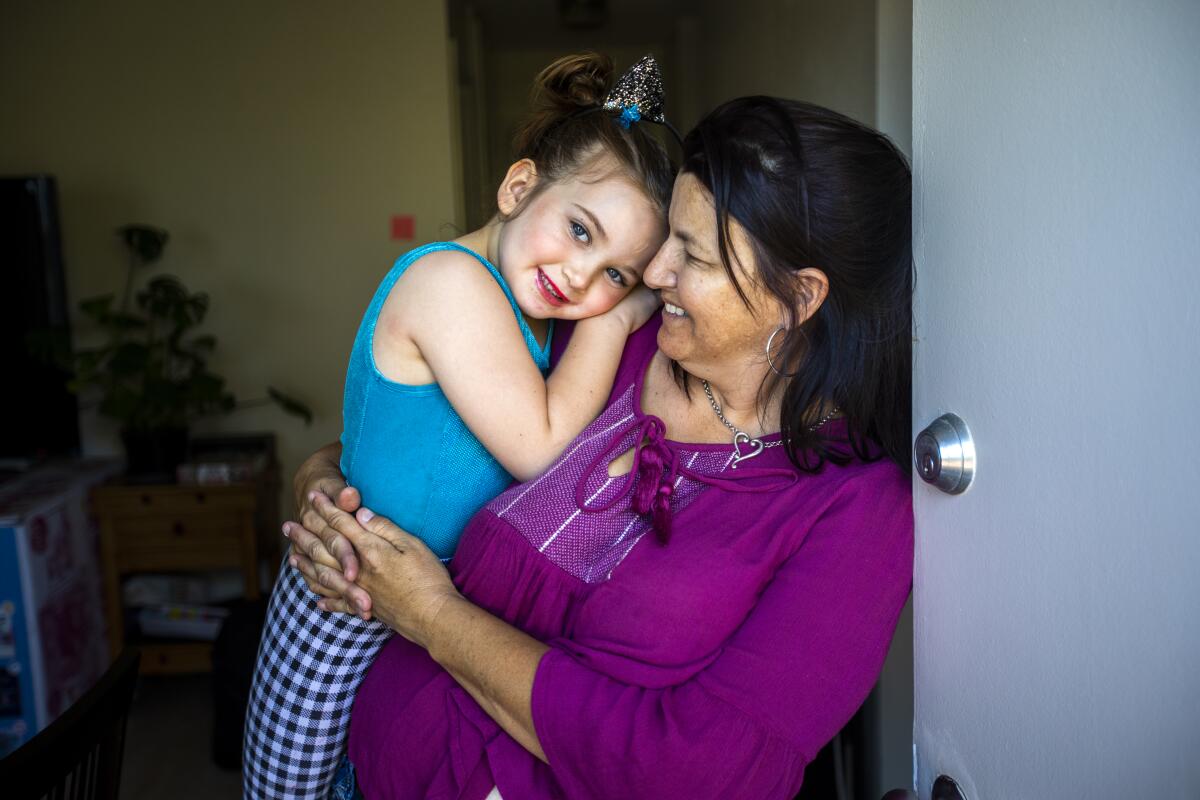‘They were devastated’: Uncertainty for housing seekers amid rapidly changing guidance

- Share via
Donovan Henry was relaxing in his motel room in Long Beach last Wednesday when he received a panic-inducing text.
It was from his caseworker with the nonprofit NoHo Home Alliance. And it said that the county had announced that all emergency federal housing vouchers, such as the one he was issued last summer, would be suspended Jan. 31.
For the record:
4:01 p.m. Jan. 30, 2023A previous version of this article referred to the NoHo Home Alliance as the NoHo Housing Alliance.
If he couldn’t find an apartment by then, he would go back to square one in his search for affordable housing. Henry — who has mostly lived on the streets for two years and is only temporarily staying in a motel thanks to a winter shelter program — figured that meant he would soon be homeless again.
“I’ve been desperately trying to find someone to accept my voucher since July and not having any luck, so to now hear that it wouldn’t be usable as of the 31st was extremely upsetting,” the 52-year-old said. He said he was waiting to find out if he’d “have to start the whole process all over again.”
Emilio Salas, executive director of the Los Angeles County Development Authority, says that won’t be necessary.
After telling service providers early last week that it was suspending all outstanding emergency housing vouchers, or EHVs, the authority issued a new communication walking back the move on Friday, one day after the Los Angeles Times first inquired about the policy.
Salas said in a phone interview Friday that EHV holders who can find affordable homes to move into will now be housed via alternative means — including standard Section 8 vouchers and a Los Angeles Continuum of Care program — and that they will not need to restart the byzantine housing application process.
“Today we’re issuing a new communication to those individuals and households that we are going to match them with a different rental subsidy,” he said. “Every single one that secures a unit.”
The initial communication that struck fear in the hearts of unhoused voucher holders such as Henry actually came out of a success story for LACDA and the U.S. Department of Housing and Urban Development’s emergency housing voucher program.
In July 2021, HUD awarded 70,000 EHVs to housing authorities across the U.S., including 1,964 to LACDA. More than a year later, only 641, or 32.6% of them, had been “leased up” or “leased out.” That means the people they were issued to “secured a unit and they entered into a fully executed lease agreement, a contract agreement with the property owner,” Salas said.
Now, six months later, all 1,964 vouchers have been leased out, according to Salas. In other words, 1,964 individuals or families across the county who were issued the vouchers have moved into homes where the rent will be heavily subsidized by the federal government, or they have signed the paperwork to do so and will be moving in soon.
The problem, however, is the county issued far more than 1,964 emergency housing vouchers. Since July 2021, HUD data show, the county has issued 5,124 of the federal vouchers, a tactic akin to airlines overbooking flights to ensure every seat is filled.
The idea, Salas said, is that many people wouldn’t be able to find affordable places to move in to because of the difficult housing market in L.A. and the reticence of landlords to rent to people with poor credit, past evictions and other characteristics common among EHV holders.
“You always have to over-issue vouchers in order to hit the target that you want to hit,” he said. “Otherwise it will take twice as long. We’re not going to issue 1,964 vouchers and stop there because we know based on historical data that not everyone will find a unit.”
But that left 3,160 people holding vouchers they were suddenly told last week would soon be useless. That initial communication from LACDA announcing the suspension of EHVs caused unnecessary anxiety and distrust for voucher holders, according to Tara Jones, a caseworker at the NoHo Home Alliance, which works with unhoused people, including many who had been issued the vouchers.
“I love what they’re saying, and I hope that it’s real what they’re saying,” she said. “With that being said, the process of people acquiring EHVs and finding these units is so arduous, so overwhelming and so difficult, that throwing this at them — even though it will hopefully turn out OK — is really troubling.”
Although she understands the county’s reasoning for over-issuing EHVs, Jones said LACDA should have held off on announcing the suspension of existing vouchers until it had the alternative funding streams in place.
“The whole concept of overselling the vouchers is difficult to explain to a person who’s experiencing homelessness. It’s not an airline seat; it’s someone’s life,” she said.
“They were devastated, and felt they had checked all the boxes they were told to secure this voucher and they felt lucky … and for it to be pulled from them, many people felt like, ‘This is why I don’t trust the system.’”
Meanwhile, some people who were issued EHVs by the city of L.A. have heard rumors that their vouchers were also being suspended. In an email Friday, Carlos VanNatter, Section 8 director for the Housing Authority of the City of Los Angeles, said that’s not the case: “HACLA’s EHV program is not ending Jan. 31. … Our program is continuing.”
Henry said he was distraught when he received the text from his caseworker last Wednesday. After months of exhaustively searching for a place to live — calling landlords, sending out applications, paying application fees, knocking on doors — he thought he was back where he started. Now, he said, he doesn’t know what to think.
“I was very worried immediately, like how am I going to find a place in a week and possibly get the paperwork processed?” he said.
“Will it be another year before I get housed? No one can confirm how long it’s going to take. I’m crossing my fingers and hoping.”
More to Read
Sign up for Essential California
The most important California stories and recommendations in your inbox every morning.
You may occasionally receive promotional content from the Los Angeles Times.










